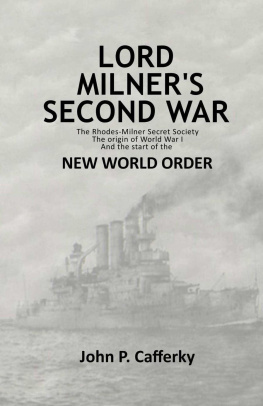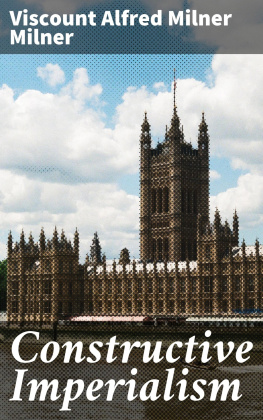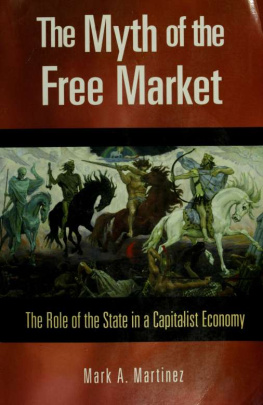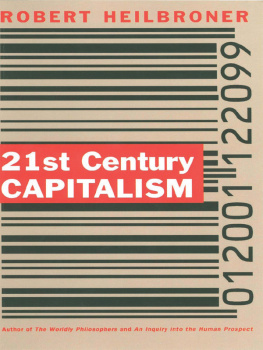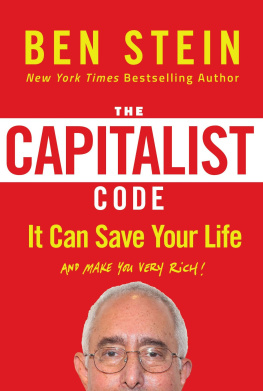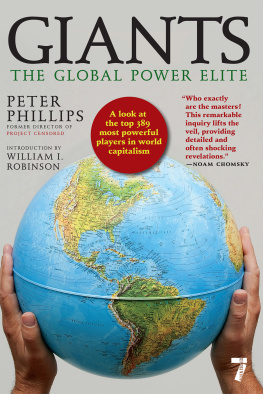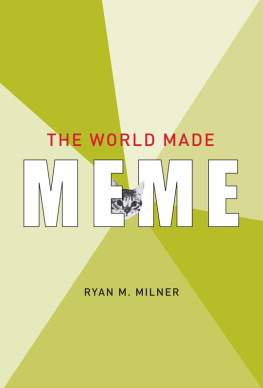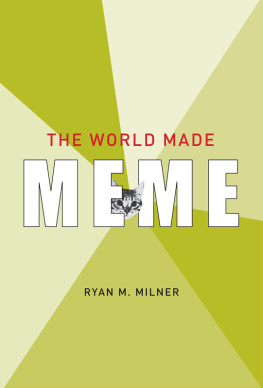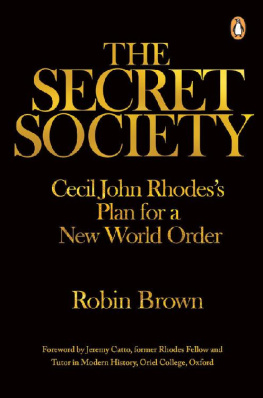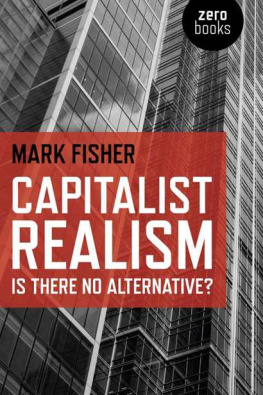Lord
Milners
Second War:
The Rhodes-Milner Secret Society;
The origin of World War I;
And the start of the
NEW WORLD ORDER
John P. Cafferky
Copyright 2013 John Cafferky
All rights reserved.
ISBN: 1481940325
ISBN-13: 978-1481940320
To George Orwell
in appreciation of
Nineteen Eighty-Four
And
To Bridjette
in gratitude for
Your Unwavering Support
Table of Contents
Introduction
The Rhodes-Milner secret society (The Milner Group), based in England, colluded with President Poincar of France and Ambassador Izvolsky of Russia to foment the seminal event of the twentieth centurythe 1914-18 First World War. Izvolsky destroyed Czarist Russia; Poincar led a million-and-a-half of his countrymen to their graves; but victory for the Milner Group left this secret organization of imperialists and financiers wielding enormous influence in world affairs. The primary source on the Rhodes-Milner secret society is Carroll Quigley, a Georgetown professor. He wrote two books, Tragedy And Hope and The Anglo-American Establishment, in which herevealed the existence of this secret society, and partially revealed what they do and the enormous influence they wield. In the former he says:
There does exist, and has existed for a generation, an international Anglophile network... I know of the operations of this network because I have studied it for twenty years and was permitted for two years, in the early 1960s, to examine its papers and secret records. I have no aversion to it or to most of its instruments. I have objected, both in the past and recently, to a few of its policies... but in general my chief difference of opinion is that it wishes to remain unknown, and I believe its role in history is significant enough to be known.
In his later work, The Anglo-American Establishment, Quigley examines the Anglo side of the organization and he makes the following claims about the Rhodes-Milner secret society:
For these men were organizing a secret society (in 1891) that was, for more than fifty years, to be one of the most important forces in the formulation and execution of British imperial and foreign policy.The power and influence of this Rhodes-Milner group in British imperial affairs and in foreign policy since 1889, although not widely recognized, can hardly be exaggerated.Any effort to write an account of the influence exercised by the Milner Group in foreign affairs in the period between the two World Wars would require a complete rewriting of the history of that period.
Quigley claims he read the secret documents of this organization. His claim leaves no wriggle room: either we dismiss him as a crank or we test his claim against the historical record. I have written a monograph to test Quigleys assertions that a powerful secret society exercises enormous political and financial influence in the western world by examining the role the Rhodes-Milner Group played in bringing about the Great War. I concentrate on the Great War because it is both the defining event of the Twentieth Century and also immensely rich in documentary evidence. My monograph uses Quigley's revelations, hints, and subtle signposts to outline how the Rhodes-Milner secret society, under the stewardship of Lord Milner, fostered the Great War. It is a case study in conspiracy theory in which I document the beginning of the Rhodes-Milner secret society, which continued as the Milner Group before and during World War I, which in turn evolved into the Anglo-American Establishment after World War I, and which finally matured as the New World Order and Bilderberg Group of the present. If you, the reader, accept the evidence and arguments presented in my work, perhaps you will give far greater credence to the imminent threat of totalitarianism posed by the New World Order and the Bilderberg Group. I use the term totalitarianism not in the sense of Stalinism but in the sense of Orwells Big Brother, absolute totalitarianism.
Legitimate secret political pursuits have nothing to do with conspiracy. Our society permits the secret association of individuals and groups who wish to influence elections and government policies. Not all secret pursuits are conspiracies, but all conspiracies are by their nature secret and they invariably clandestinely violate societys rules and laws. To reach the standard of conspiracy, the goals and the means used to achieve those goals must cross a liberally drawn line of what a modern society will tolerate. Therefore, most secret campaigns do not come close to meeting the standard of conspiracy, because what they are trying to achieve does not cross this all-important line of tolerance. Conspiracy implies rule-breaking and more often than not it implies flagrant rule-breaking.
Historians object to secret organizations and theories of conspiracy because these organizations do not open their archives to scrutiny. The professional historian argues that one cannot do history without documents. The absence of documents poses a serious challenge, but ignoring a possible conspiracy neither addresses the conspiracy nor the problem of gathering the evidence. Ignoring a conspiracy does not make the problems that suggested the conspiracy disappear, and that is the fatal weakness of the academics disdain. Having said that, conspiracy theorists must present a credible strategy to compensate for the lack of documentsthe academic historian has a valid point.
The difficulty of keeping a conspiracy secret varies proportionately to its scale so the bigger the conspiracy the more likely exposure becomes. At a critical threshold, the conspirators must control history, and in the spirit of Samuel Butler "God cannot alter the past, though historians can," arrange for their version of events to become the official historical record. No major conspiracy can remain secret if the conspirators cannot control the writing of history. Therefore, the Rhodes-Milner secret society must have edited the historical record to both disguise their role and to promote their version of events. If history has been edited, there must arise instances when the official version of events does not accord with the historical facts.
Historians cannot alter the reactions of people caught up in the events. Whether great historical events just carry people along in their wake, or whether some significant individuals bring about great historical events, every individual involved experiences those events in the immediate now without foreknowledge of what will happen. Therefore, if history has been edited, the people caught up in some events must display inappropriate behavior, emotions and reactions when viewed through the lens of official history. In edited events, one can show incoherence between the historical accounts and the actual events.
Incoherence between the facts and the accounts of an event is sufficient proof of historical editing and editing proves the existence of an editor. Therefore, incoherence becomes the touchstone or standard for proving the existence of the conspiracy. With the conspiracy settled, one can begin revising the historical record. In the present case, if I can show a conspiracy, Twentieth Century history will require much revision. My plan of campaign is as follows:
In the first chapter I introduce the Rhodes-Milner secret society, outlining how it arose and introducing the philosophy of Cecil Rhodes, the architect of the organization. In the second chapter Lord Milner goes to South Africa as the British High Commissioner, and he provokes the South African War, also known as the Boer War. This chapter proves the secret society had both the capacity and the will to plan and to start a war. Not all secret societies have the enterprise, arrogance and audacity to start wars so this secret society already stands apart from the rest. In the third chapter I cover the scorched-earth policy whereby British soldiers destroyed every farm in the Transvaal and in the Orange Free State. I also introduce the infamous concentration camps in which 27,000 Dutch women and children died. If a young British woman, Emily Hobhouse, had not exposed the high mortality in the camps, the death toll would have been far higher. The chapter shines a light on the dark side of Milners character, an essential characteristic for a man accused of fomenting a second war that would slaughter millions. Also in this chapter I introduce three liberal imperialists, Herbert Asquith, Richard Haldane, and Sir Edward Grey. Haldane and Grey belonged to the Rhodes-Milner secret society and from 1906 onward they carried out the Groups policy of fomenting a European war.
Next page
